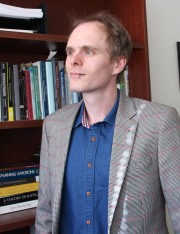Richard B. Gibson is a bioethicist and moral philosopher. He holds a PhD in Bioethics & Medical Jurisprudence from the University of Manchester, an MA in Bioethics and Society from King’s College London, and a BA(Hons) in Philosophy from the University of the West of England. Before joining UTMB, he was a Teaching Associate in the University of Manchester’s Department of Law.
Richard’s research interests typically fall at the intersection of human enhancement, novel technologies, novel beings, disability theory, and body modification. His thesis, “Body Integrity Identity Disorder and Cyborgs: An Exploration of the Ethics of Elective Amputation and Enhancement Technologies”, tackled the social, ethical and legal ramifications of permitting therapeutic, healthy limb amputation in cases of Body Integrity Identity Disorder. The work: (i) questioned the appropriateness of such amputations in the context of the ‘internal morality of medicine’, drawing upon Georges Canguilhem’s epistemology as a counterargument; (ii) employed the social model of disability as a means of discrediting arguments against healthy limb amputation; (iii) acknowledged the impact technology has on the nature of disability; and (iv) highlighted how English and Welsh law’s nebulous conception of harm obscures the legality of radical medical interventions.
His current work covers a range of issues, including cryopreservation, non-military conscription, global health and distributive justice, the philosophy of death and nihilism, and the utilization of obfuscatory legal language.
